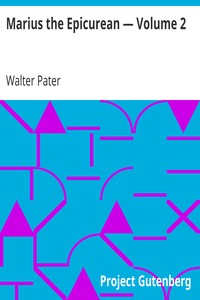Marius the Epicurean — Volume 2 by Walter Pater
"Marius the Epicurean — Volume 2" by Walter Pater is a philosophical novel written in the early 20th century. It continues the exploration of the main character, Marius, as he contemplates the nature of morality, beauty, and the human experience against the backdrop of ancient Rome. The book delves into Marius's evolving understanding of Epicurean and Stoic philosophies, reflecting on his personal development and the societal influences around him. The opening of
the second volume introduces Marius during a public discourse at the temple of Peace, where the Stoic philosopher Cornelius Fronto delivers a speech on the Nature of Morals. Marius is deeply affected by this address, prompting him to reflect on his own philosophical beliefs and the apparent disconnect between his Epicurean ideals and the moral expectations of society. As he grapples with these thoughts, he begins to question the validity of his previous convictions, exploring the interplay between aesthetic beauty and ethical behavior. The narrative sets the stage for Marius's internal struggle as he searches for a way to reconcile his personal ideals with the broader moral landscape of his time. (This is an automatically generated summary.)
Read or download for free
| How to read | Url | Size | |||
|---|---|---|---|---|---|
| Read now! | https://www.gutenberg.org/ebooks/4058.html.images | 331 kB | |||
| EPUB3 (E-readers incl. Send-to-Kindle) | https://www.gutenberg.org/ebooks/4058.epub3.images | 223 kB | |||
| EPUB (older E-readers) | https://www.gutenberg.org/ebooks/4058.epub.images | 222 kB | |||
| EPUB (no images, older E-readers) | https://www.gutenberg.org/ebooks/4058.epub.noimages | 207 kB | |||
| Kindle | https://www.gutenberg.org/ebooks/4058.kf8.images | 396 kB | |||
| older Kindles | https://www.gutenberg.org/ebooks/4058.kindle.images | 381 kB | |||
| Plain Text UTF-8 | https://www.gutenberg.org/ebooks/4058.txt.utf-8 | 319 kB | |||
| Download HTML (zip) | https://www.gutenberg.org/cache/epub/4058/pg4058-h.zip | 203 kB | |||
| There may be more files related to this item. | |||||
About this eBook
| Author | Pater, Walter, 1839-1894 |
|---|---|
| Title | Marius the Epicurean — Volume 2 |
| Note | Wikipedia page about this book: en.wikipedia.org/wiki/Marius_the_Epicurean |
| Credits | Alfred J. Drake. HTML version by Al Haines. |
| Reading Level | Reading ease score: 57.0 (10th to 12th grade). Somewhat difficult to read. |
| Language | English |
| LoC Class | PR: Language and Literatures: English literature |
| Subject | Historical fiction |
| Subject | Bildungsromans |
| Subject | Young men -- Fiction |
| Subject | Christian fiction |
| Subject | Rome -- Fiction |
| Subject | Christianity and other religions -- Roman -- Fiction |
| Category | Text |
| EBook-No. | 4058 |
| Release Date | May 1, 2003 |
| Most Recently Updated | Sep 3, 2021 |
| Copyright Status | Public domain in the USA. |
| Downloads | 440 downloads in the last 30 days. |
| Project Gutenberg eBooks are always free! | |

